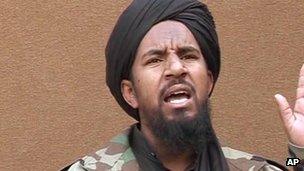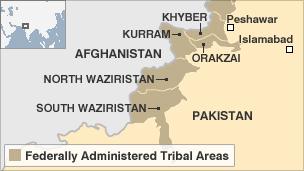Al-Qaeda commander Abu Yahya al-Libi killed - US officials
- Published

Libi is reportedly in charge of day-to-day operations in Pakistan's tribal areas
Senior al-Qaeda leader Abu Yahya al-Libi was killed in a drone strike in Pakistan on Monday, US officials say.
US officials said Libi was the target of an attack which hit a volatile tribal area of Pakistan's north-west, killing 15 suspected militants.
There has been no confirmation of his death from sources in Pakistan.
The White House says Libi's death deals a heavy blow to al-Qaeda's operations as he played a critical role in the group's planning against the West.
"There is no-one who even comes close in terms of replacing the expertise al-Qaeda has just lost," one US official said.
The official added that al-Qaeda's leadership "will be hard-pressed to find any one person who can readily step into [Libi's] shoes".
'Operational chief'
Washington believes that following Osama Bin Laden's death last year, Libi, an Islamic scholar from Libya, became al-Qaeda's second-in-command after Egyptian-born Ayman al-Zawahiri.
Libi had gravitas as a longstanding member of al-Qaeda's leadership, the official said, and his religious credentials meant he had the authority to issue fatwas and provide guidance to other militants.
Analysts have said that he was in charge of day-to-day operations in Pakistan's tribal areas.
He was believed to be the interface between Pakistan's militant commanders and al-Qaeda operations in Yemen, Iraq and elsewhere.
He was reported killed in a drone strike in Pakistan in 2009, but it turned out to be a case of mistaken identity.
Pakistan's frontier tribal region is considered a hub of activity by al-Qaeda and Taliban militants and it is very difficult to verify information from the region.
Reporters are prevented by the authorities from travelling to the area.
There are no further details explaining how US officials are certain that Libi was killed by the drone strike.
White House spokesman Jay Carney said that the intelligence community had information which led them to conclude he had been killed.
"I can't get into details about how his death was brought about but I can tell you he served as Al-Qaeda's general manager," Mr Carney said.

In Monday's strike, two missiles were fired at a suspected militant compound in Hesokhel, east of Miranshah - the main town in the volatile tribal region of North Waziristan.
The first missile struck the compound, killing three militants, Pakistani security officials said.
A second missile then killed 12 more militants who had arrived at the scene, they added.
Pakistani anger
It was just the latest assault after a recent surge of attacks in Pakistan - there have been eight drone strikes over the past two weeks.
It sparked anger in Pakistan and the foreign ministry lodged a formal protest with Washington's deputy ambassador to Islamabad, Richard Hoagland.
Islamabad has called for an end to drone strikes saying they violate their sovereignty, and today the government issued a statement saying they represented a "clear red line for Pakistan".
But analysts say that Pakistan has privately sanctioned such action in the past.
Nevertheless, tension between the reluctant allies has been intensified by a dispute over Pakistan's closure of supply routes to Nato troops in Afghanistan, after a Nato air strike along the Afghan border killed 24 Pakistani soldiers.
Many observers believe the latest surge was designed to apply pressure on Islamabad after a deal to reopen supply routes fell through.
But drone strikes have increased in frequency since President Barack Obama took office in 2009 and hundreds of people have been killed.
The dead include senior al-Qaeda and Taliban leaders, as well as an unknown number of other militants and civilians, stoking public anger in Pakistan.
The US does not normally comment on individual drone operations, but this strike came after it emerged in <link> <caption> the New York Times</caption> <url href="http://www.nytimes.com/2012/05/29/world/obamas-leadership-in-war-on-al-qaeda.html" platform="highweb"/> </link> that the US president personally approves or vetoes each drone strike.
- Published5 June 2012
- Published30 May 2012
- Published4 May 2012
- Published1 May 2012